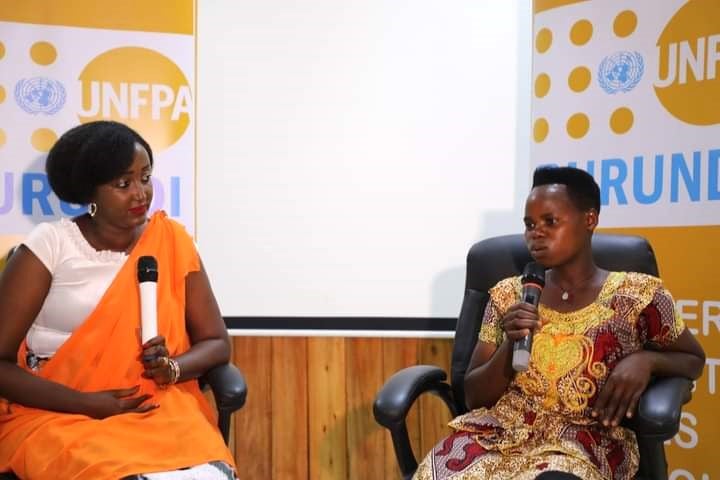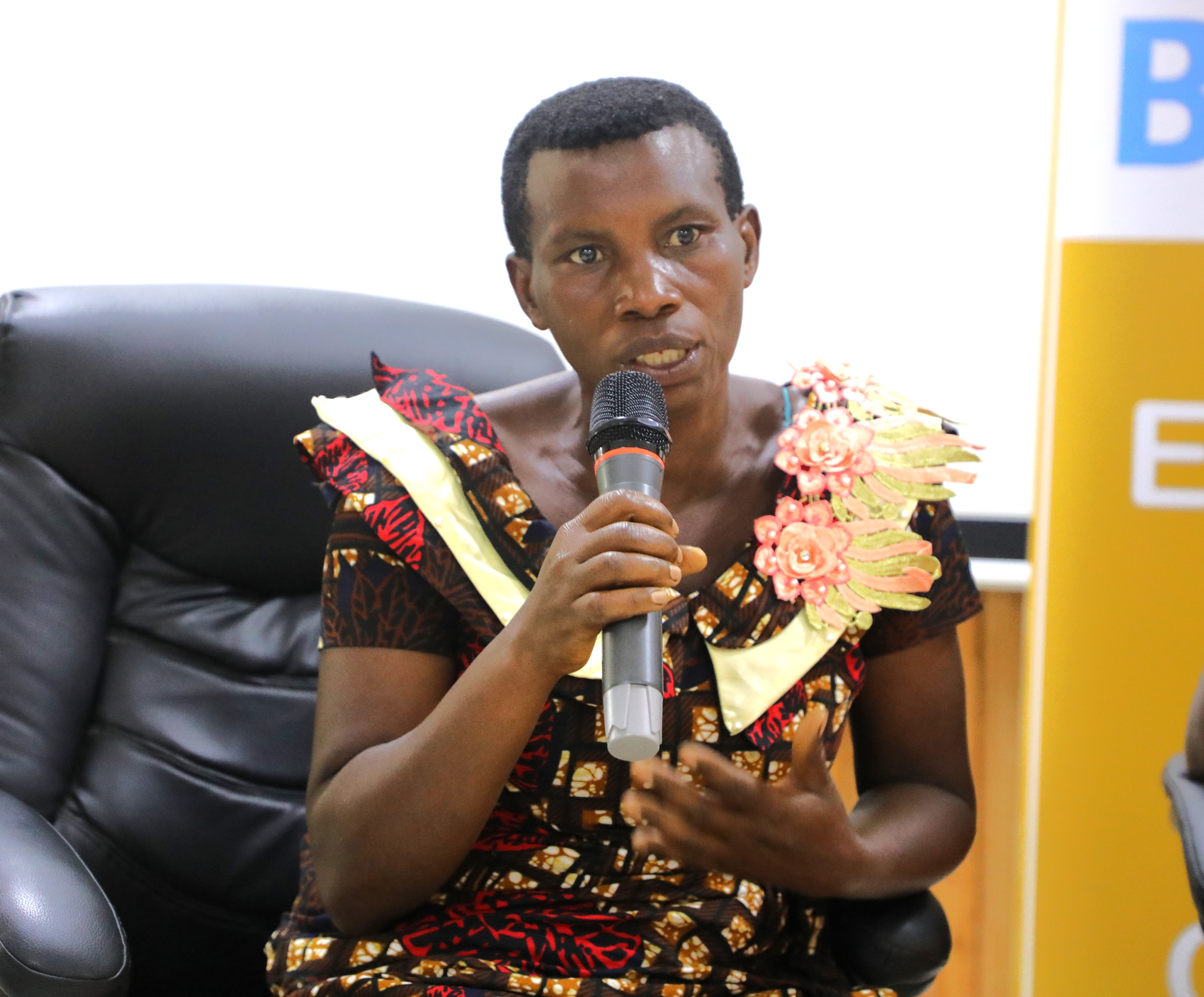“I lost my baby, and women at the maternity ward were demanding that I be chased away because I was giving off foul odors; but thanks to you, I've recovered my healing and my dignity,” testifies Donavine Ndayikengurukiye, a 23-year-old woman who suffered from obstetric fistula, in Burundi known as backyard disease, at the age of 19. Donavine was one of the people present on friday february 09, 2024, when the United Nations Population Fund (UNFPA) launched its 09th Cycle of Cooperation Program with Burundi, which will last 04 years (2024-2027). It was a day rich in emotion. At times tears of compassion, at other times giggles following several moving and instructive testimonials on the results already achieved. Indeed, the best way to launch this new program was to revisit the achievements of the previous program (2019-2023), whose closing ceremonies were held on the same day.
Executives from various ministries and provincial administrations, delegates from embassies and UN agencies, representatives of various national and international organizations, the media, not forgetting delegates from youth associations, were all present at the ceremonies to launch the new cooperation program between Burundi and UNFPA. Fruitful discussions were held following the results achieved over the last 5 years.
Behind statistics, saved lives!
Over the course of its program, UNFPA Burundi and its partners have supported Burundi in accelerating the access vision towards the achievement of the 3 transformative results also known as the 3 zeros, namely: zero preventable maternal deaths, zero unmet need for family planning and zero gender-based violence and harmful practices. Encouraging progress was recorded by Burundi and shared at the meeting on Friday. With major results shared in each area, this was an opportunity to put faces behind the telling data, not only so that everyone can appreciate the true value of the work that has been accomplished, but also to enable everyone to return home with new energies and commitments to save more lives.
Donavine Ndayikengurukiye spoke of the ordeal of women suffering from obstetric fistula. Having become pregnant at the age of 19, she didn't understand what was happening to her when she developed obstetric fistula. Obstetric fistula is a condition that occurs because of complications during childbirth. "In my community, I was nicknamed the woman who peed on herself. In the street, children booed me, oh what a shame,” shares Donavine with great emotions; emotions that were even felt throughout the room.

Thanks to the support of UNFPA through the Ministry of Public Health and the Urumuri Center (the only center treating obstetric fistula in Burundi), 661 women underwent surgery during the 08th Program, and 94% of them are completely cured. Donavine, who is one of them, was blessed with a baby girl a year after her recovery and opted with her husband for family planning. "I think I got obstetric fistula because I gave birth when I was very young. My husband and I opted for family planning, not only to give my body a rest from the risk of having another obstetric fistula, but also to wait for our little girl to grow up a little,” she adds. In addition, support has been given to some of these women to enable them to reintegrate into society and the economy, something which Donavine believes has given her stability and respect in her community.
Like Donavine, Médiatice Karikumutima is another woman who has regained respect thanks to her economic empowerment. Abandoned and left to fend for herself with 6 children by her husband, she no longer knew what to do or how to survive with her children. But today, her life has completely changed thanks to the women's solidarity group to which she belongs in Mwaro province. This is one of the solidarity groups that have received support from UNFPA through the ministry in charge of gender to help empowering women and combat gender-based violence. Self-reliant, she has regained the respect of her husband and those around her: “My husband had abandoned me, and each time he threatened me, but thanks to UNFPA's support, I’ve made a lot of money. I was able to build a house for my children and myself, and I started raising livestock". Mediatrice shared that her husband came back home and that today he has the utmost respect for his wife. Médiatrice took the opportunity to sensitize other women in her community, which enabled her to become a member of the communal administration: “When my husband heard I was able to get up again, he came back home and apologized. We have reconciled, and today he doesn't treat me the way he used to. I'm now raising awareness in my community, especially among women like me, telling them to believe in themselves and stand up for themselves, so that they can go much further and win the respect of their family and community”.

Several testimonies were shared and aroused a great emotion. Like the testimony of this girl who became a mother at the age of 14 and whose hard life and bad company opened the doors to sex work. As shared anonymously, this young mother was a victim of sex trafficking. With many tears, she shared how much many young girls at her age need to be rescued like she was. In this way, they can be saved and look forward to a better future. Thanks to UNFPA's support, this young mother and other sex workers have been given sewing machines after sewing training. She testifies that she is no longer a sex worker, but she now has a promising sewing workshop, and she made a lot of progress by combining sewing with other small businesses.
Numerous testimonials were shared to demonstrate the work carried out with populations in humanitarian emergencies, particularly women and girls, and UNFPA's work in the fight against gender-based violence and HIV. These testimonies gave rise to enriching exchanges and awareness-raising. The various participants appreciated the testimonies, which made them realize that, while lives have certainly been changed, each person in his or her own field can do his or her bit to continue improving the lives of these populations.
Accelerating to save more lives
At the end of the 08th program, considerable results have certainly been achieved, but challenges remain which will serve as a basis for the implementation of the new program cycle (9th cycle: 2024-2027). Although the trend is downward (from 6.4 in 2010 to 5.5 in 2016, according to the Demographic and Health Surveys (EDSB II and III), the total fertility rate remains high, and is linked to low use of family planning services and early entry into reproductive life, contributing to maternal mortality in Burundi, estimated in 2016 at 334/100,000 live births. According to Burundi's 2010 Demographic and Health Survey (EDS), the mortality ratio is 500 women per 100,000 live births, reflecting a downward trend, but efforts are still needed, especially in terms of quality of care, to curb maternal mortality within hospitals, which remains high. The low level of knowledge and information about sexual and reproductive health among adolescents and young people, the lack of health facilities offering sexual and reproductive health services adapted to the needs of young people, and the shortage of staff trained to provide youth-friendly sexual and reproductive health services all represent significant development challenges. As a result, we need to work in synergy and complementarity to accelerate results and achieve the 3 transformative results mentioned above.
Judicaël Elidje, UNFPA Resident Representative, called on everyone to reconcile strengths and means to protect the lives of women, young girls and boys, and the whole community. "Imagine a 10-year-old girl in a remote corner of the country. What can we do to make her dream come true one day? What can we do to ensure that she goes to school and doesn't get pregnant at an early age? What can we do to ensure that when she grows up, she gives birth in a healthy way, and that she and her husband can flourish thanks to family planning?", Judicaël Elidje proposed several ideas to the assembly, which were followed by several other contributions:
“We need to do everything we can to keep young girls at school. They're not supposed to go through the ordeal we've heard about in the various testimonies"; ” We need to raise awareness so that parents learn to dialogue with their children. We also need to engage in frank and realistic dialogue between partners to protect our children from life accidents due to a lack of clear and correct information..."; ‘It's not normal that women continue to die giving birth or lose their babies, we all need to invest so that motherhood remains a source of joy’; ”We often talk about girls who have been raped, girls who get pregnant while still at school, women whose lives are still in danger, but where are the men? What are we doing to raise awareness among young boys and men, so that they no longer see girls and women as objects? We need to focus on raising men's awareness and punishing those who commit offences, to discourage all kinds of rape".
Various opinions and future perspectives were shared. It was also an opportunity for some to understand what kind of complementarity needs to be initiated, thanks to the different shared testimonies. The need for men involvement was also emphasized. When the man gets involved, the family can only get better and better, as in the case of Dismas Niyonkuru, who has adopted a contraceptive method adapted to men: vasectomy. "My wife didn't want to hear about contraceptive methods because of the rumors about vasectomy and religious beliefs. But I told her that beyond 4 children we couldn't ensure their future. We had to do something, because I've never seen my pastor bring me a bag of beans to feed our children or treat them when they fall ill. The responsibility lies with the parents, and they have to make consistent choices and decisions,” says Dismas. He added that his wife no longer complains, and that she also helps him raise awareness among other couples in their community.
Over the last 10 years, Burundi's overall population has grown rapidly by 30.1%, from 9.5 million in 2010 to 12.3 million in 2020. In 2020, 61% of this population is under 25 years of age, a figure that is set to rise to 56% by 2030, according to demographic projections. Encouraging progress has been recorded by Burundi in family planning, with a modern contraceptive method prevalence rate of 23% according to the EDSB III 2016/2017, compared with 18% in 2010.
By Queen BM Nyeniteka


